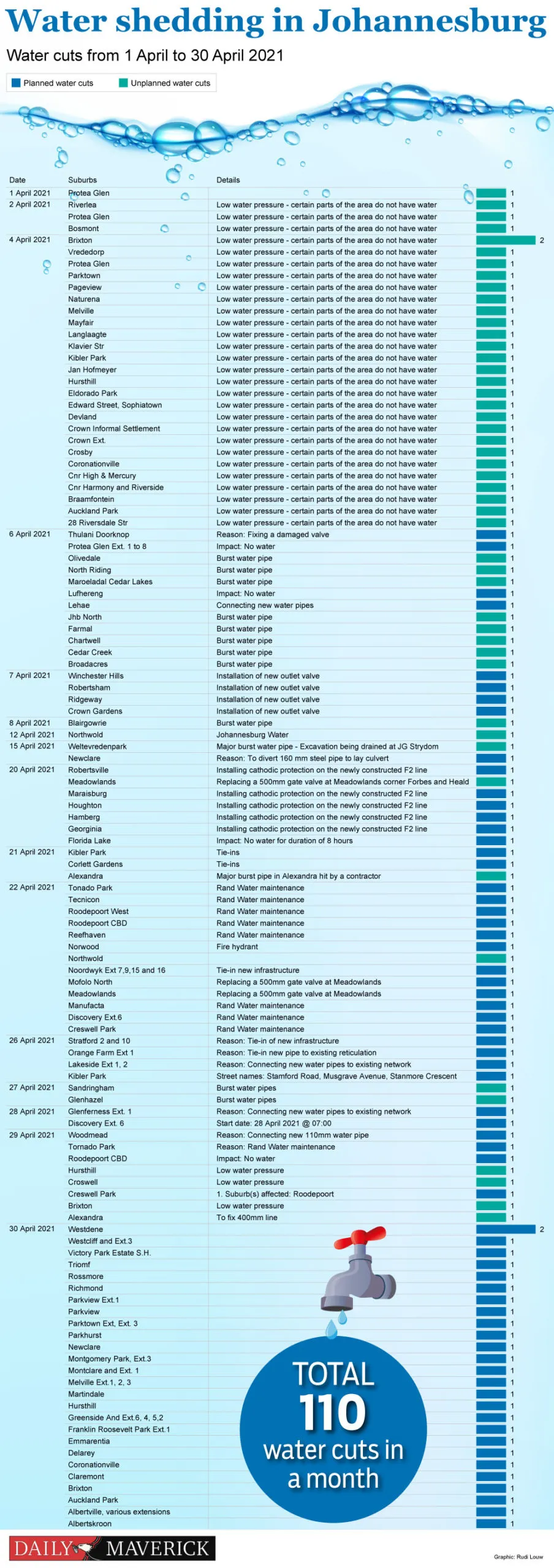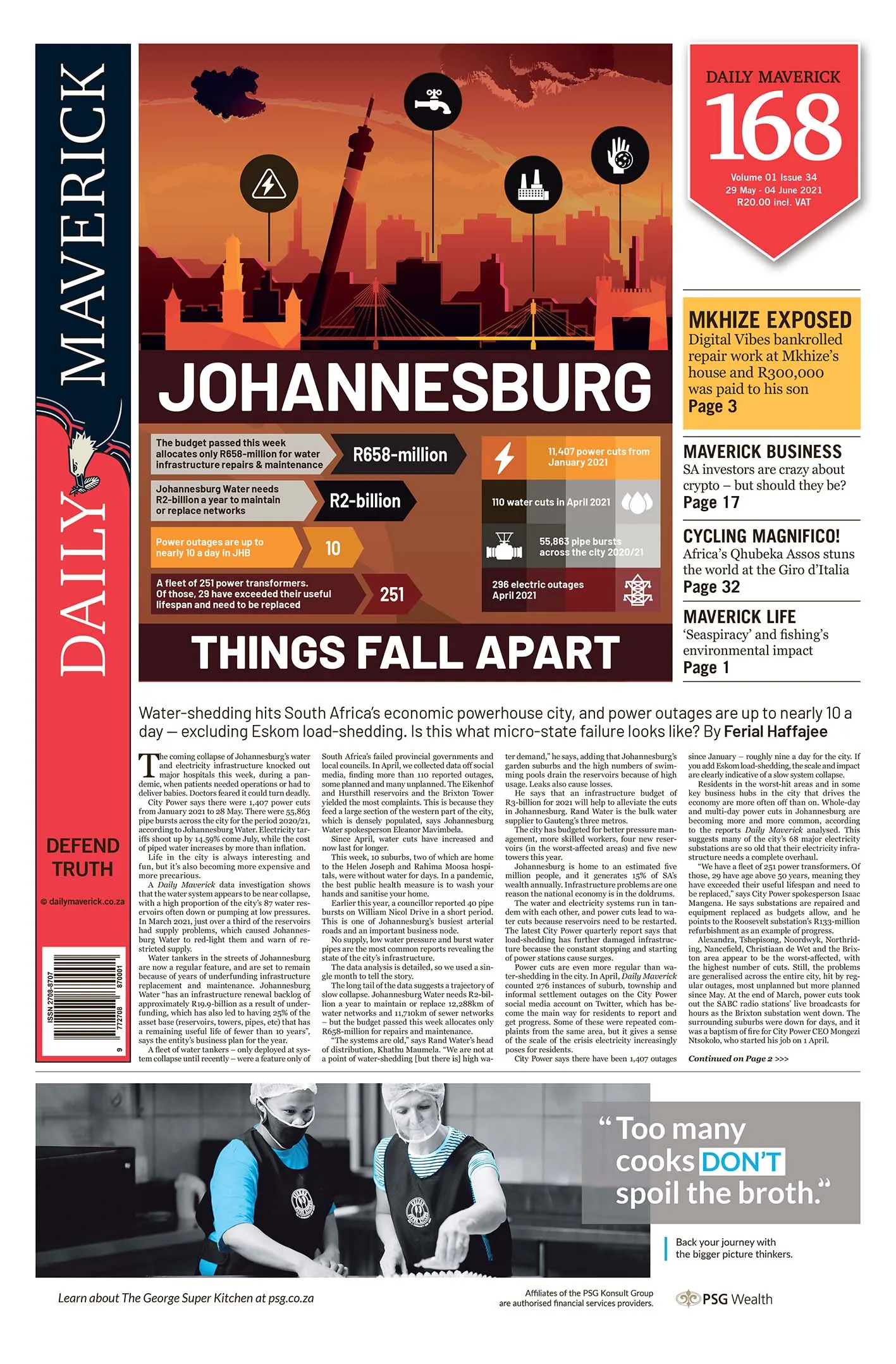First published in the Daily Maverick 168 weekly newspaper.
The looming collapse of Johannesburg’s water supply knocked out major hospitals last week, during a pandemic, when patients needed operations or had to deliver babies. Doctors feared it could turn deadly.
There were 55,863 pipe bursts across the city for the period 2020/21, according to Johannesburg Water. Electricity tariffs shoot up by 14.59% come July, while the cost of piped water increases by more than inflation.
Life in the city is always interesting and fun, but it’s also becoming more expensive and more precarious.
A Daily Maverick data investigation shows that the water system appears to be near collapse, with a high proportion of the city’s 87 water reservoirs often down or pumping at low pressures. In March 2021, just over a third of the reservoirs had supply problems, which caused Johannesburg Water to red-light them and warn of restricted supply.
Water tankers in the streets of Johannesburg are now a regular feature, and are set to remain so because of years of underfunding infrastructure replacement and maintenance.
Johannesburg Water “has an infrastructure renewal backlog of approximately R19.9-billion as a result of underfunding, which has also led to having 25% of the asset base (reservoirs, towers, pipes, etc) that has a remaining useful life of less than 10 years,” says the entity’s business plan for the year.
Fleets of water tankers – only deployed at system collapse until recently – represent South Africa’s failed provincial governments and local councils.
In April, we collected data from social media, finding more than 110 reported outages (see graphic), some planned and many unplanned. The Eikenhof and Hursthill reservoirs and the Brixton Tower yielded the most complaints. This is because they feed a large section of the western part of the city, which is densely populated, says Johannesburg Water spokesperson Eleanor Mavimbela.
Since April, water cuts have increased and now last for longer.
Earlier in May 2021, 10 suburbs, two of which are home to the Helen Joseph and Rahima Moosa hospitals, were without water for days. In a pandemic, the best public health measure is to wash your hands and sanitise your space.
The taps ran dry at both hospitals again at the weekend as the Hursthill reservoir went on the blink as it has done several times in 2021 already. The supply area is among the most overcrowded in Johannesburg with at least two growing informal settlements and a number of townships supplied by it.
Earlier this year, a councillor reported 40 pipe bursts on William Nicol Drive in a short period. This is one of Johannesburg’s busiest arterial roads and an important business node.
No supply, low water pressure and burst water pipes are the most common reports revealing the state of the city’s infrastructure.
The data analysis is detailed, so we used a single month to tell the story.
The long tail of the data suggests a trajectory of slow collapse. Johannesburg Water needs R2-billion a year to maintain or replace 12,288km of water networks and 11,710km of sewer networks – but the budget passed this week allocates only R658-million for repairs and maintenance.
“The systems are old,” says Rand Water’s head of distribution, Khathu Maumela. “We are not at a point of water shedding [but there is] high water demand,” he says, adding that Johannesburg’s garden suburbs and the high numbers of swimming pools drain the reservoirs because of high usage. Leaks also cause losses.
He says an infrastructure budget of R3-billion for 2021 will help to alleviate the cuts in Johannesburg. Rand Water is the bulk water supplier to Gauteng’s three metros.
The city has budgeted for better pressure management, more skilled workers, four new reservoirs (in the worst affected areas) and five new towers this year.
In Johannesburg, in some communities that can, people are digging boreholes to secure water as shortages become more common.
It isn’t easy to call a collapse in a city as vibrant as Johannesburg, but when the network infrastructure that holds the metropolis together begins to flail and then to take down hospitals, the broadcaster and the economy, the red flags go up. The city carries the country and the collapse of one has an impact on the other. DM168
This story first appeared in our weekly Daily Maverick 168 newspaper which is available for free to Pick n Pay Smart Shoppers at these Pick n Pay stores.




















 Become an Insider
Become an Insider
Thanks for this Ferial. One of our best and most tenacious journalists!
Thanks very much for these timely articles, the infrastructure in the city is definitely collapsing. The area referred to in the article was without water over the weekend, as power to Eikenhoff pumping stations was out due to cable theft. Some areas have been struggling with water shortages for weeks. There is truly an infrastructure crisis, and the electricity and water systems are collapsing. People are indeed having to get off grid and dig their own boreholes for water, because government cannot be depended on for any services.
Apocalypse 2027. No electricity. No water. Then we are back to pre-industrial Africa. The millions in the city cannot find or grow food. Armageddon has arrived. Rampaging mobs, bedlam, murder, mayhem: Followed by the stillness of a pre-colonial Africa run by many local ‘kings’.
Who said being decolonised would be a joyous and painless affair?
City Engineers all over has warned for years; infrastructure in all cities and towns are failing. This is due to underinvestment in maintenance and reconstruction for more than 50 years.
Think about it. If pipes, roads, etc. last for 50 years, you have to invest in reconstruction/maintenance to the tune of 2% of the total asset value annually (roughly). Best practice standards talk about up to 4%. I doubt if any city/town in the last 50 years reached 0.5%.
This is also a world-wide phenomenon. This is also a symptom relating to all political leadership since the last war!
Engineers are not listened to, as it is un-sexy to invest in pipes and sewage treatment works – that does not win you elections. Also, rates may never go up; people are not prepared to pay market value for their water and sewerage. That value will become apparent soon. Remember what everyone was willing to pay for bottled water.
So, the great infrastructure fail is coming. It has started but is not “yet” a crisis. It is actually, but not yet obvious.
The sad part is, once the failure reaches critical point, it will take years and years to restore. Maintenance is no longer good enough. Reconstruction of infrastructure, at more than 10 times the maintenance cost, does not happen overnight.
Load shedding was the start. Water shedding is coming. That does not only mean No Water, it also means No Sewerage! Think disease.
I started by saying Engineers are not listened to. It is time someone listened.
You are correct. I bet water works will be a vote getter pretty soon.